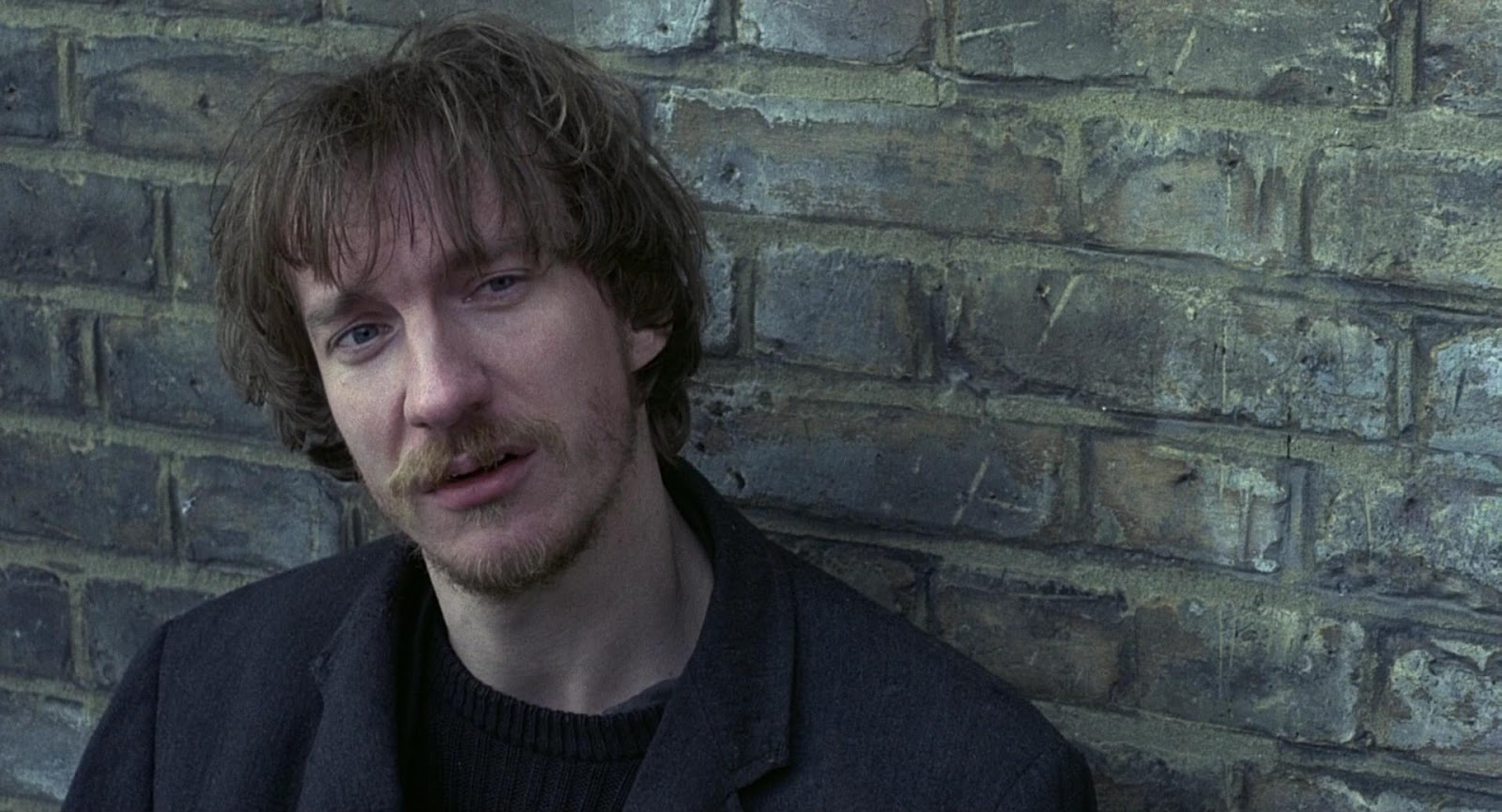
Austere and uncompromising, Mike Leigh’s tragicomic film from 1993, Naked, is arguably his level best and certainly the bleakest British masterpiece of the 1990s.
A controversial and compelling compass of urban society, this staggering arthouse triumph––it won best director and best actor prizes at the 1993 Cannes Film Festival––is a showcase of several talents and a sullen pièce de résistance.
Johnny (David Thewlis) is a gloom and doom drifter, full of strange fascination and constant dazzle, he’s in trouble and on the run. His nocturnal odyssey of London will connect disparate lives, doomsday augury, danger, tenderness, savagery, strange comedy, and resonant poetry. The following list shall articulate a handful of reasons why Naked is such a raw, rowdy, funny, and terribly troubling masterwork, and a film that, nearly 25 years on, remains a dark and shining jewel of British cinema.
7. Naked remains Mike Leigh’s most visionary film
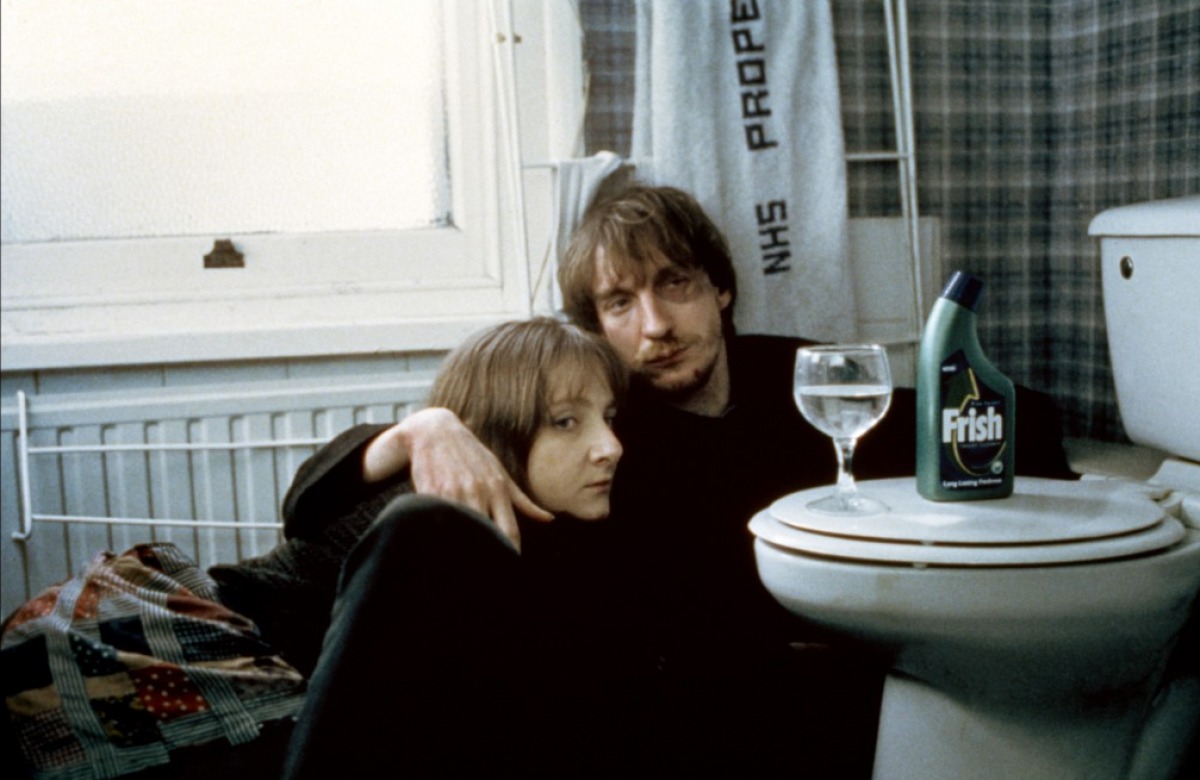
There are few directors working today that can lay bare the pained complexity of society like Mike Leigh, be it the “kitchen sink realism” of films like High Hopes (1988), Life is Sweet (1990) or Secrets & Lies (1996) or in his meticulous rendered biopics like Topsy-Turvy (1999), and Mr. Turner (2014). And yet, when considering Leigh’s distinguished and impressive body of work there is one film that sticks out like the proverbial sore thumb and that film is the visionary, volatile, and poignant pitch-black tragicomedy, Naked (1993).
Arguably Leigh’s finest, fiercest, and most unforgettable film, Naked may also be the best British film in recent memory, artfully capturing the zeitgeist of the 1990s, tapping into the millennial anxiety that was everywhere at the time.
Shockingly, the script from which Naked sprang was a scant 25 pages long. Like much of Leigh’s work, the process of making the film begins with the creation of the characters, long before there’s a script, and often story cues and other cinematic elements derive from the workshopping process that Leigh and his cast endure. This allows for a largely improvisational aesthetic, and while risky, in the case of Naked, the rich insights and surprising compassionate gaps feel all the more convincing and 24-karat.
Photographed with an unexpected high-contrast lensing from cinematographer Dick Pope, a regular collaborator of Leigh’s, this specific stylization lends Naked a narrow, bleak, and desolate sheen.
“[Naked is] about masks, it’s about the thing we are forced to be, that society expects us to be. The tension between that and what’s behind the mask. All the characters in my film are dealing with pretentiousness.”
– Mike Leigh
6. Johnny is a wonderfully complex antihero
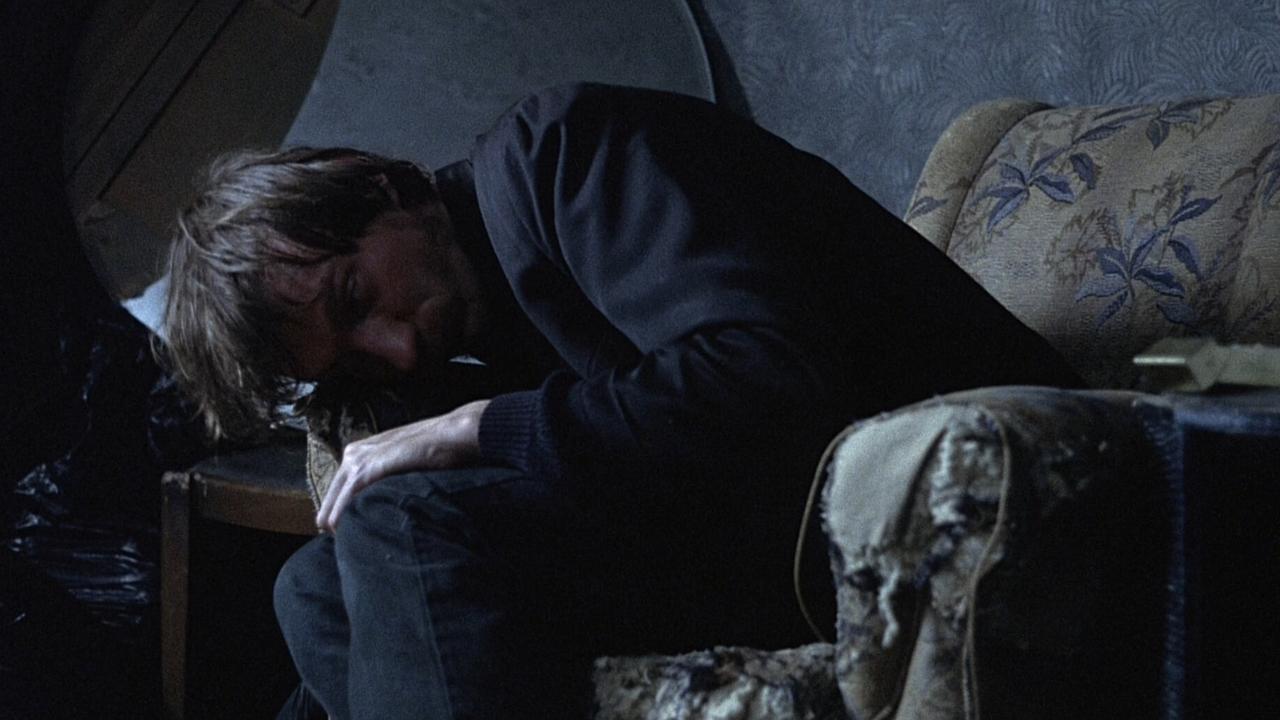
Certainly the most compelling element to Naked is its problematic protagonist and antihero, Johnny. From the film’s opening where we bear uncomfortable witness to him having rough sex with a woman in a Manchester alley to the final fleeting frames as he staggers and gimps away down the middle of the road to God know’s where, Johnny is impossible to ignore, and, for all his many and numerous flaws, is deeply fascinating and often utterly charming.
As the audience gets familiar with Johnny it is soon acknowledged that he’s a self-destructive cyclone with an askew moral compass, and yet he’s a man capable of tenderness, insight, wit, and whimsey, who repeatedly expresses rich and arousing bursts of poetry and perception.
“Johnny’s an idealist, certainly not a cynic, which is how he’s often portrayed.”
– Mike Leigh
It’s only fitting that a character capable of such lyrical caprice and also such self-destruction as Johnny also have something of the Bard in his veins. As a Hamlet-esque character, it’s no accident that William Shakespeare’s Dane is a huge influence on the character. In the same way that Hamlet is continually witty, crazy, and incessantly speaking to everyone in his orbit, so too does Johnny. He even shrouds himself in a black coat, giving him a shadowy and somber disposition, like a vigilant tragedian.
The other big referential salute from Johnny is to one of Leigh’s favorite films, Jean Renoir’s 1932 comedy of manners, Boudu Saved from Drowning. Here Renoir’s titular antihero is one Priape Boudu (Michel Simon), a complex tramp bent on seduction, self-sabotage, and trouble. And like Renoir’s film, Naked tests and tries tensions amidst the domesticated bourgeois and the more anarchic and unruly, making for a character driven melodrama of startling power.
It’s also been suggested that Johnny could possibly be a modern messiah, a flawed but forgiving Jesus attempting to change the lives of those in his widening sphere. His constant jeering and his insights into the End of Days––such as the wormwood prophecy that he details enthusiastically––certainly lends itself to many interpretative theories.
“”Have you ever thought, right, that you have had the best moment in our life and all we have got to look forward to is sickness and purgatory?”
– Johnny (played by David Thewlis)
5. Naked launched David Thewlis’ career
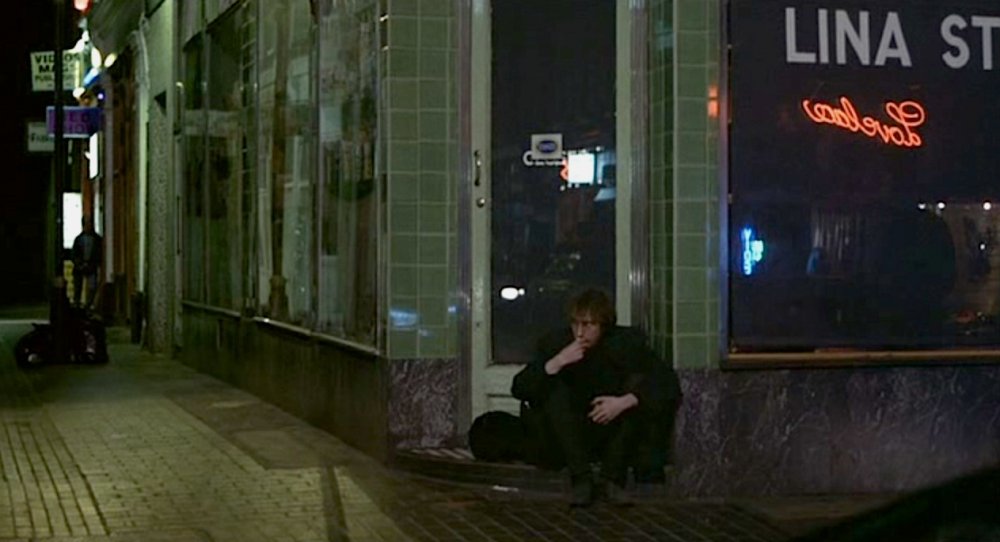
As with all of Mike Leigh’s films, the cast of Naked are all incredibly realized, deeply fascinating, and difficult to forget after you’ve spent a little bit of time with them. And David Thewlis, in particular, as Johnny, is stunning and absolutely fearless in a demanding, often unflattering, and entirely convincing role. Thewlis manages to be synchronously sarcastic, sympathetic, obnoxious, silver-tongued, and of considerable intellect, too.
Mike Leigh has said of his lead’s performance that “Thewlis just erupted in this part and it’s indelible, the mark he made.” It’s fair to say that Thewlis hasn’t had as demanding, dizzying, and provocative a role since, and it’s a shame. But perhaps so startling a role only appears once in an actor’s entire career.
That said, to have created a character like Johnny, one so memorable, quotable, and strangely charming is a tenuous and rarefied thing––one of those lightning-in-a-bottle instances that an actor always yearns for but seldom if ever achieves. And how uncommon, too, for a character to tear a viewer in two directions simultaneously!
“[David Thewlis’] performance never steps wrong. He creates a kind of heroism in Johnny: It’s not that we like him or approve of him, but that we must admire the dogged way he sticks to his guns and forges ahead through misery, anger and despair.”
– Roger Ebert
4. A strong and fearless supporting cast
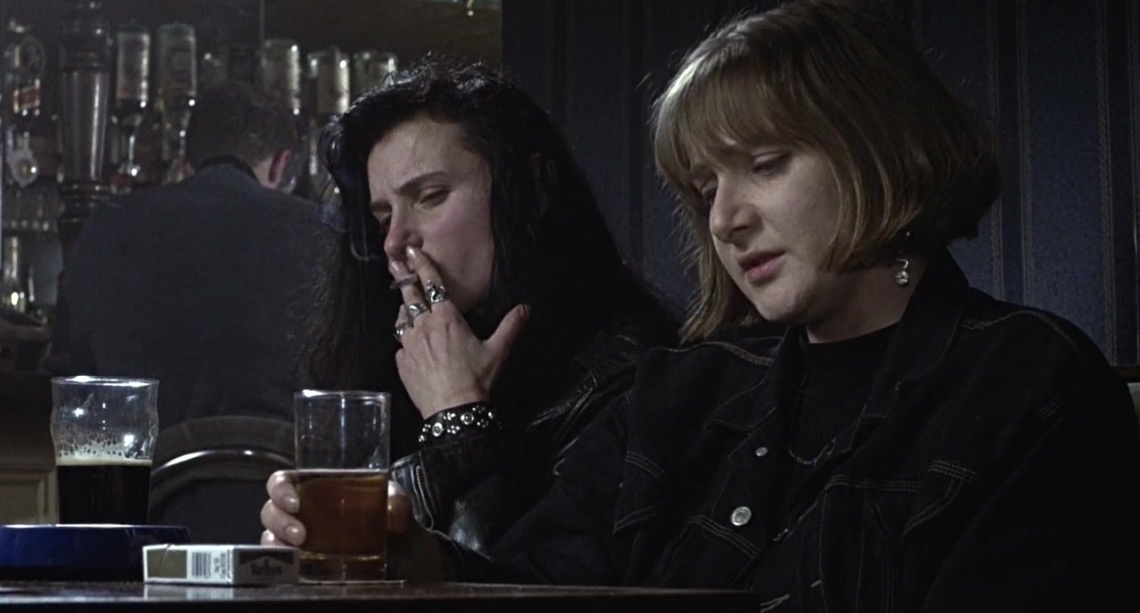
While Thewlis rightly won a wealth of awards for his portrayal of Johnny––including prizes from Cannes, the National Society of Film Critics, the London Critics Circle Film Awards, and the New York Film Critics Circle––his wasn’t the only career to get a kick from Naked.
Gina McKee, who plays the small but significant role of the “Cafe Girl”, the one whom Johnny suspects stole a tea cosy for a chapeau, would go on to land plum roles in acclaimed British fare like Croupier (1998), Nottinghill (1999), and In the Loop (2009).
Also holding her own against the likes of Thewlis, Lesley Sharpe (The Full Monty) is wonderful as Louise Clancy, Johnny’s ex. In fact, Louise holds her own up to the often offensive Johnny, and her journey is, in many ways, every bit as pained and panicked as his.
In his lengthy introduction to Naked for the Criterion edition, writer/director Neil LaBute (In the Company of Men, Nurse Betty) joyfully exclaims: “[Lesley Sharpe] is “the unsung hero of that particular film; she’s so real, and so good, you can feel the pain of seeing Johnny again.”
Also incredible in their minor roles are Peter Wright (Vera Drake, Hot Fuzz) as the maudlin security guard Brian, Greg Cruttwell (2 Days in the Valley) as Jeremy, a demonic sexual predator who is also somehow a frightful shadow of Johnny’s, and Ewen Bremner (“Spud” from Danny Boyle’s Trainspotting films, amongst other roles), who somehow manages to usurp Thewlis’ thunder in their few scenes together as Archie, the damaged and riled Scotsman with a tic.
But for my money, the performer her holds her own to Johnny the most is Katrin Cartlidge. Sophie, sadly, is subject to much abuse, exploitation, and exhaustion, but the dignity, strength, and tangled empathy that Cartlidge brings to her role, well, it’s no wonder that Leigh would cast her in several more roles until her tragic and untimely death at age 41 in 2002 from pneumonia and septicaemia complications.
“She took to the improvisation and character work instantly, easily and with extraordinary commitment and imagination,” Leigh wrote in an elegy to her, adding that “she had had no formal training, but you would never have guessed it.”
“I think [Naked] is a very probing dissertation on relationships… about the way that we interact with people, the way in which people, particularly in a city, find themselves so isolated.”
– Katrin Cartlidge
3. Naked makes for a scathing social satire
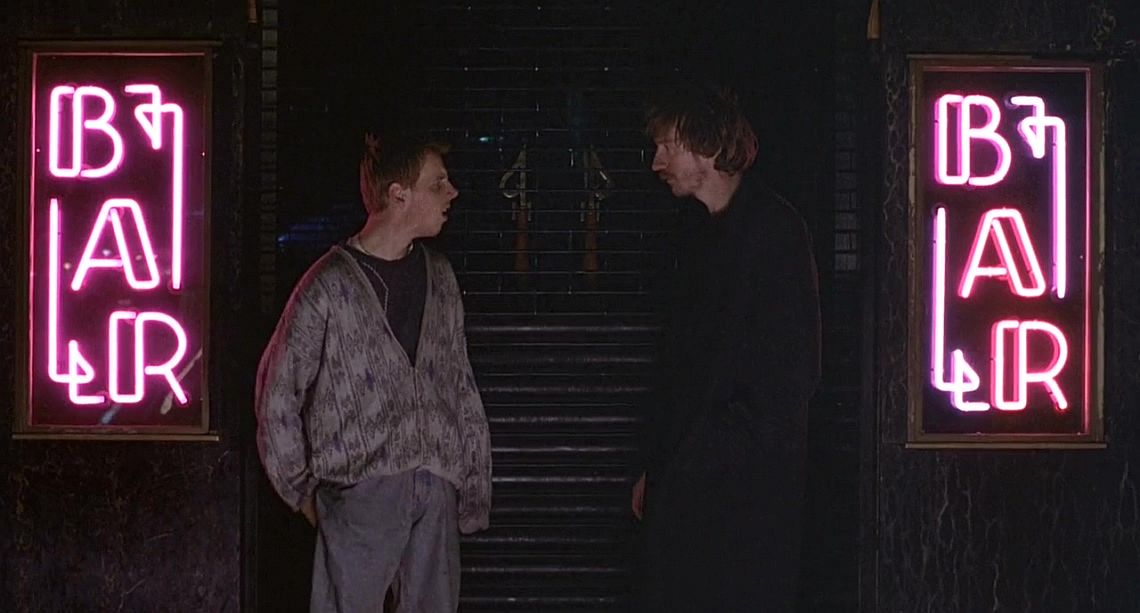
In the same way that Woody Allen has a very distinctive New York or that Federico Fellini has his own take on Rome or that Yasujirō Ozu’s Tokyo is his own, so too is the London of Naked specific to Mike Leigh. The London that Johnny stumbles and swears through is a byproduct of Leigh’s own imaginings, reinvented and reworked in a way that only the movies can do it. That’s not to say it isn’t a recognizable and inhabited space, it is, but it’s also one of pretension, hyperbole, and a degree of fantasy.
Naked is a film overrun with discourse and dialogue, and yet so many of the denizens that dwell there are unable to communicate their feelings. Johnny and the lives he intrudes upon regularly evade one another despite the number of times they crash together. These characters make love but they do so lovelessly, and in cold blood, it seems.
Naked is peopled by trapped characters, many representative of different pecking orders or cliques, some are about to self-destruct, others already have, ideas of family are up for grabs in the dysfunction we witness, the class struggle is real. Urban society from frustrated housewives, lonely security guards, over-sexed and over-privileged white males, and more abound and none are spared the lash.
2. A brilliant existential tragicomedy
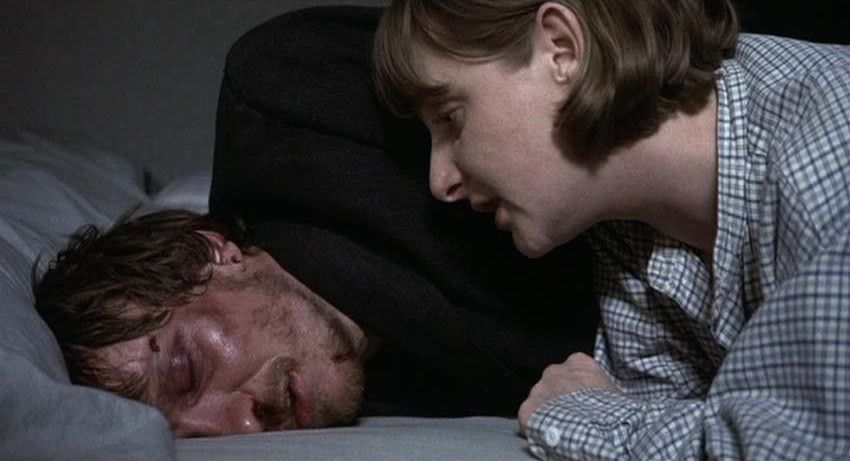
“All right, listen. Does anybody mind if I scream here? Is that okay with you all? Cause I’d feel better for it. It won’t take long.”
– Johnny (played by David Thewlis)
In this list we’ve already suggested the sting of social satire, the idea of Naked being some wayward latter day Christ tale, and more, but what it all adds up to is that this is a film of the moment, and that moment may have been in 1993, but it’s also now, a holy moment, there whenever the film is experienced. As existential tragicomedy, Naked takes the raw, rejected, an unpolished prize.
“Leigh has said in an interview that while his earlier films might have embodied a socialist view of the world,” writes film critic Roger Ebert in his four star review of the film. “[Naked] edges over into anarchy. I agree. It suggests a world in which the operating systems have become distant from such inhabitants as Johnny and the women in the flat…. The world is indifferent to them, and they to it. To some degree, they don’t even know what’s hit them. Johnny has a glimmer. His response is not hope or a plan. It is harsh, sardonic laughter. Destruction is his only response.”
“All right, I’m not saying that life will end or the world will end, or the universe will cease to exist. But man will cease to exist. Just like the dinosaurs passed into extinction, the same thing will happen to us. We’re not fuckin’ important. We’re just a crap idea.”
– Johnny (played by David Thewlis)
1. For all of its danger and difficulty, Naked endures as a challenging and unforgettable film
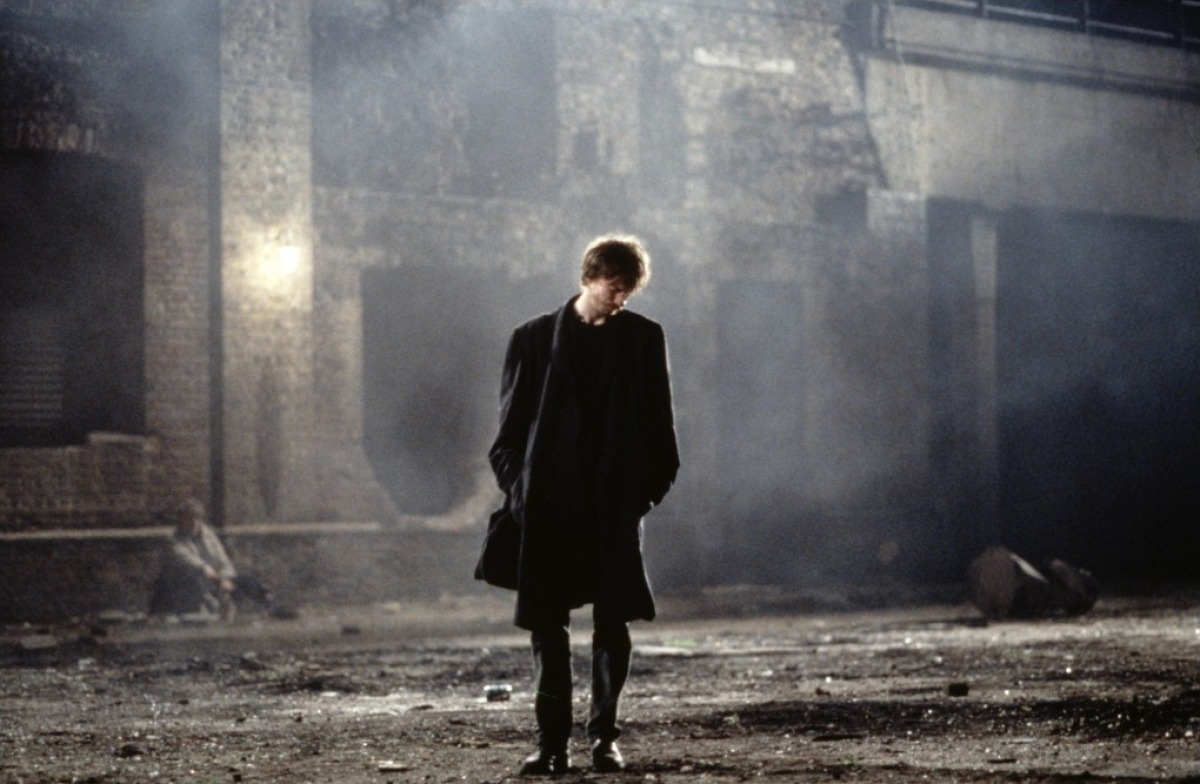
Amidst bouts of chronic neuralgia, bilious attacks, and in an increasingly rare for Johnny, moment of clarity, he shares with his new “wicky wacky friend, Sophie” something that’s stayed with me, viewing after viewing of this gobsmacking and disquieting film. Quoting from one of his journals Johnny says to her: “Resolve is never stronger than in the morning after the night it was never weaker.”
No line in Naked is a throwaway extract, and Johnny’s proclamation on resolve isn’t something truly meant for Sophie, it’s meant for him, and yet he misses it. But living a life as deeply troubled as his own, it’s easy to understand why this is. He can so often dish it out, but Johnny regularly can’t take what he prescribes to others.
Undeniably the most difficult aspect of Naked, and the one that gets people the most worked up, and rightly so, is in the treatment of women. From the opening of the film when we witness Johnny having rough sex through to the film’s final fleeting moments we many times see women being abused and violated. Society is a misogynistic place, abusive relationships abound, and sex battles are fought, lost, and sometimes won.
There’s no shortage of irony and contempt in such sex battles, especially the ones portrayed in Naked. Johnny and the women he affects, namely Louise and Sophie, display a complex array of emotions. Savagery and tenderness, cruelty and care, the lives of these men and women are treated with seriousness and strain. Horror and hubris is shown in their tight situations, and this is how abusive relationships should be depicted, is it not?
“This is a painful movie to watch. But it is also exhilarating, as all good movies are, because we are watching the director and actors venturing beyond any conventional idea of what a modern movie can be about. Here there is no plot, no characters to identify with, no hope. But there is care: The filmmakers care enough about these people to observe them very closely, to note how they look and sound and what they feel.”
– Roger Ebert
Naked is not the kind of film that makes you feel safe and secure, but nor is it a didactic sermon against society. It’s a movie that you experience and stumble away from, weak-kneed and reeling, your mind just blazing.
It departs hugely from Leigh’s other works––usually domestic dramas about families––stylistically and thematically Naked is more attuned to the arthouse cinema we’d seen from late greats Krzysztof Kieślowski or Alain Resnais, instead it comes from Leigh in a package of anti-social fervor and shrewdly ironic disruption.
A savage, stressful, allegorical and deeply human experience, Naked is, unexpectedly, a ticking time bomb of a film that you’ll never be able to shake off.
Author Bio: Shane Scott-Travis is a film critic, screenwriter, comic book author/illustrator and cineaste. Currently residing in Vancouver, Canada, Shane can often be found at the cinema, the dog park, or off in a corner someplace, paraphrasing Groucho Marx. Follow Shane on Twitter @ShaneScottravis.